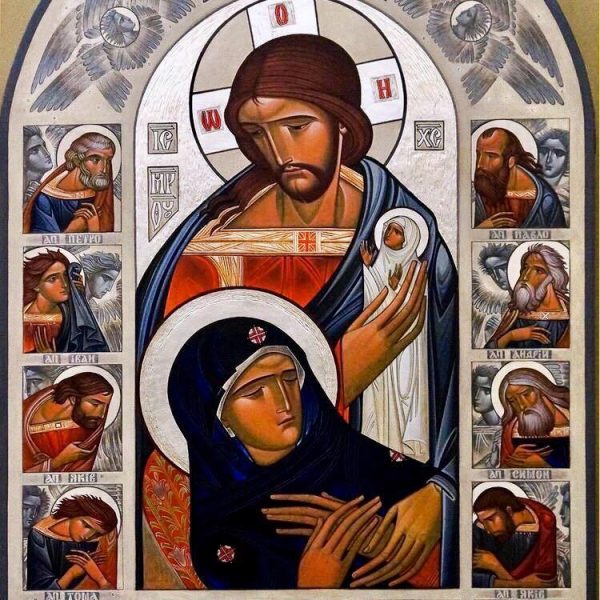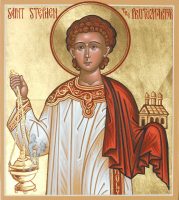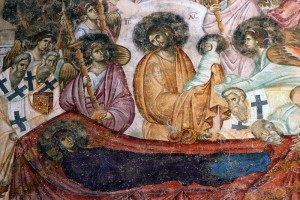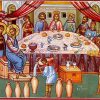I really like this icon. As is to be expected, all the apostles are mourning her passing. And why not? Scripture lists her as among the people present during the first Baptism of the Holy Spirit after Jesus’ Baptism. While nothing is found written in Scripture after that event, there is no reason to think that she was not highly honored among Christians. “Blessed are you among women, and blessed is the fruit of your womb!” exclaims Elizabeth upon seeing Mary for the first time after she is pregnant. Would it be so strange that the apostles would mourn her passing? While the records of the apostles mourning her passing are all extra Biblical, they make sense. She was full of the Holy Spirit. She suffered much. She was present at the Cross. She is mentioned in the recollections of the apostles. Given that all the apostles were the age of her only child, would it be so strange that they would honor her in a special way, particularly since she was among the first of the Spirit-filled? The older I get, the more I realize that Protestants go overly far in almost making her disappear from history, removing her from all human relationships, and almost making her little more than a baby incubator. Again, this does not mean that one has to buy into every Roman doctrine, only that one has to own up to the illogicality of every so removing her.
Also pictured on this icon is something that would be natural. Yes, Jesus is God, but Jesus is also Man. Why would it be so strange that he would mourn the earthly passing of his mother? May “Jesus wept” only be applicable to Lazarus and not to Mary? It is as though upon Ascending, Jesus becomes nothing more than God. His humanity appears to disappear, and it is little acknowledged, outside of Orthodox circles (and maybe Roman) that the two-natured person very well probably mourned the passing of his mother every bit as much as he mourned in the New Testament over several other issues! But, notice that Mary is pictured twice. Once she is pictured as the dead Mary, whom her Son is mourning. The other time she is pictured as a glorified Mary in white robes, going to the bosom of her Son. Both are true of us as well. Our bodies shall die–unless the Lord come first–but our souls/spirits shall be with the Lord. And we shall be clothed in white and every tear shall be wiped away.
But, yesterday (Pravmir’s note: The Feast of the Dormition is celebrated on August 15 or August 28 for those following the Julian Calendar), we remembered the pain of her passing, a pain strong enough that this is one of the earlier feasts of the Church. By the mid-300s, we have records of its being celebrated in Jerusalem on August 15. It may have been celebrated earlier than that, but we simply do not have records. Images of her holding Jesus in her arms are found by the early second century, when those trained directly by the Apostles were still alive. Mary’s impact on the Church was strong enough and early enough that the fundamentalist claims of her being a replacement mother-goddess fall (that is unless one buys into the mid-19th century pseudo-history concoctions of the Germans). I am not arguing that there have not been some Roman extremes concerning Mary. Yes, there have been, and various of those have been repudiated by the Orthodox. But, those extremes do not justify the Protestant/Evangelical/Fundamentalist extremes on the other side.
The bottom line is that Mary died. One of the most courageous women found in Scripture went to her deserved reward. A woman who was told by an angel that a sword should pierce her heart, because of the pain she would feel, was finally laid to rest. The pain was over. The mourning was done. Rest had come. Joy had begun.



















